Light sleepers can have a difficult time sleeping through the night. A partner stirring or getting up to go to the bathroom can wake them from a deep slumber, leaving them to a potentially challenging task of falling back to sleep again. But before you kick your partner out of bed or don a pair of noise-cancelling headphones, you might be able to improve how soundly you sleep just by getting a new bed!
In this article, we share our great mattress options for light sleepers and our top recommendations for people who wake up to the slightest noise or disturbance.
Our Pick for the Best Mattress for Light Sleepers is…
The Helix Midnight earned our editor’s pick due to its medium-firm feel, comfort layers, and cooling capabilities.
Best Mattresses for Light Sleepers
- Helix Midnight – Editor’s Pick
- Emma Original – Best Memory Foam Mattress for Light Sleepers
- DreamCloud Premier Memory Foam – Best Luxury Mattress for Light Sleepers
- WinkBed – Best Mattress for Light Sleepers with Back Pain
- Helix Dawn – Best Mattress for Light Sleepers Who Sleep on Their Stomach
- Nolah Natural – Best Mattress for Light Sleepers Who Sleep on Their Back
- Bear Star Hybrid – Best Cooling Mattress for Light Sleepers
- Brooklyn Bedding Brooklyn Essential – Best Medium Firm Mattress for Light Sleepers
Our Video Review of Best Beds for Light Sleepers

Compare the Best Beds for Light Sleepers

|
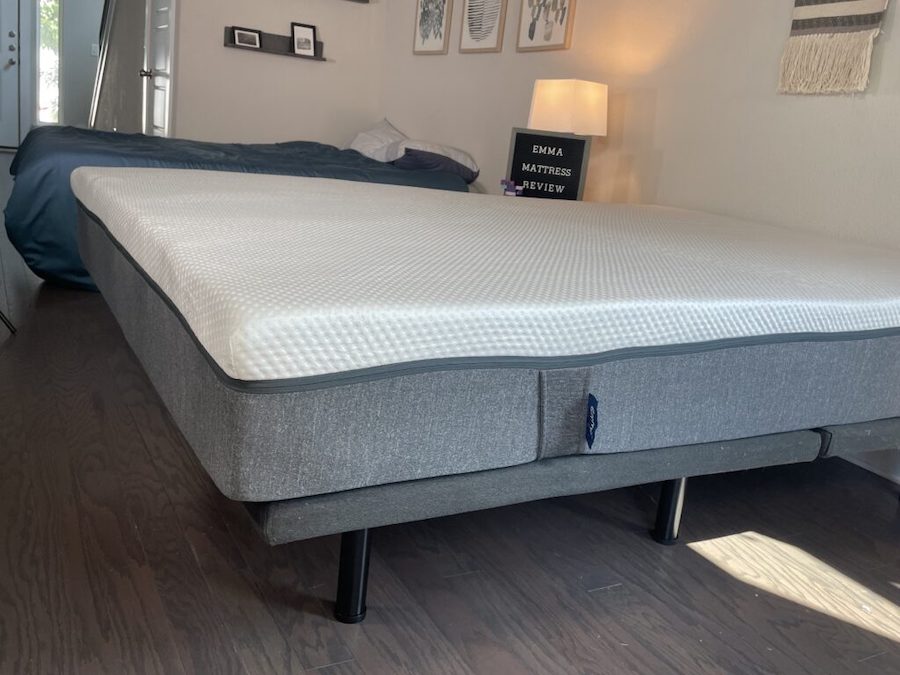
|

|

|
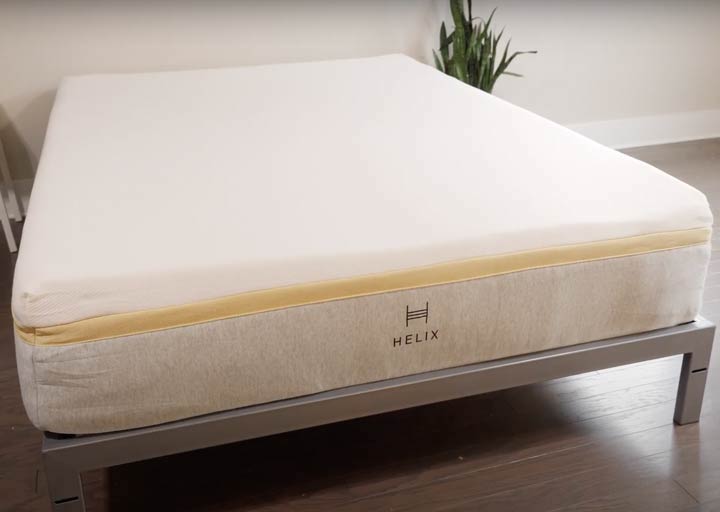
|

|
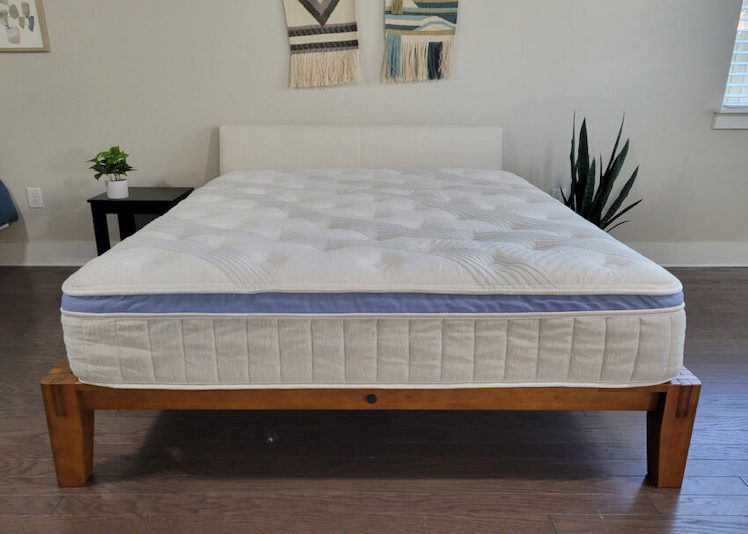
|

|
|
| Helix Midnight Mattress | Emma Mattress | DreamCloud Premier Memory Foam | WinkBed Mattress | Helix Dawn Mattress | Nolah Natural Mattress | Bear Star Hybrid Mattress | Brooklyn Bedding Essential | |
| Rating | ||||||||
| Firmness | Medium-firm: 6/10 | Medium: 5/10 | Medium: 5.5/10 | Multiple firmness options | Firm: 7.5/10 | Medium-firm: 6/10 | Medium-firm: 6/10 | |
| Material | Hybrid | Foam | Foam | Hybrid | Hybrid | Latex | Hybrid | Hybrid |
| Cooling | — |
|
— |
|
— |
|
|
|
| Warranty | 10-year warranty | 10-year warranty | Forever Warranty | Lifetime warranty | 10-year warranty | Lifetime warranty | Lifetime warranty | 10-year warranty |
| Shipping | Free shipping | Free shipping | Free shipping minus HI and AK | Free shipping | Free shipping | Free shipping | Free shipping | Free shipping |
| Trial Period | 100 nights | 365 nights | 365 nights | 120 nights | 100 nights | 120 Nights | 120 nights | 120 nights |
| Best For | Couples, Back Sleepers, Side Sleepers | Hot Sleepers, Kids, Back Sleepers | Couples, Side Sleepers, Back Sleepers, Stomach Sleepers | Back Sleepers, Stomach Sleepers, Back Pain, Hot Sleepers, Side Sleepers | Back Sleepers, Stomach Sleepers, Couples | Side Sleepers, Back Sleepers, Stomach Sleepers, Hot Sleepers, Back Pain | Joint Pain, Side Sleepers, Back Sleepers, Hot Sleepers | Back Sleepers, Side Sleepers, Hot Sleepers |
Sleep Advisor’s Testing Methodology
At Sleep Advisor, our mattress reviews are based on findings from in-person tests that allow us to have a genuine understanding of how the mattress feels and performs. We look at features that are valuable to consumers, such as temperature control, bounce, edge support, and motion isolation.
We also evaluate mattress performance for back, side, and stomach sleeping. Lying in different positions lets us know how supportive the bed is and if it’s good at relieving pressure.
We then take all the information we’ve gathered to rate the bed in specific categories. These results allow us to help our readers find the right mattress for their needs.
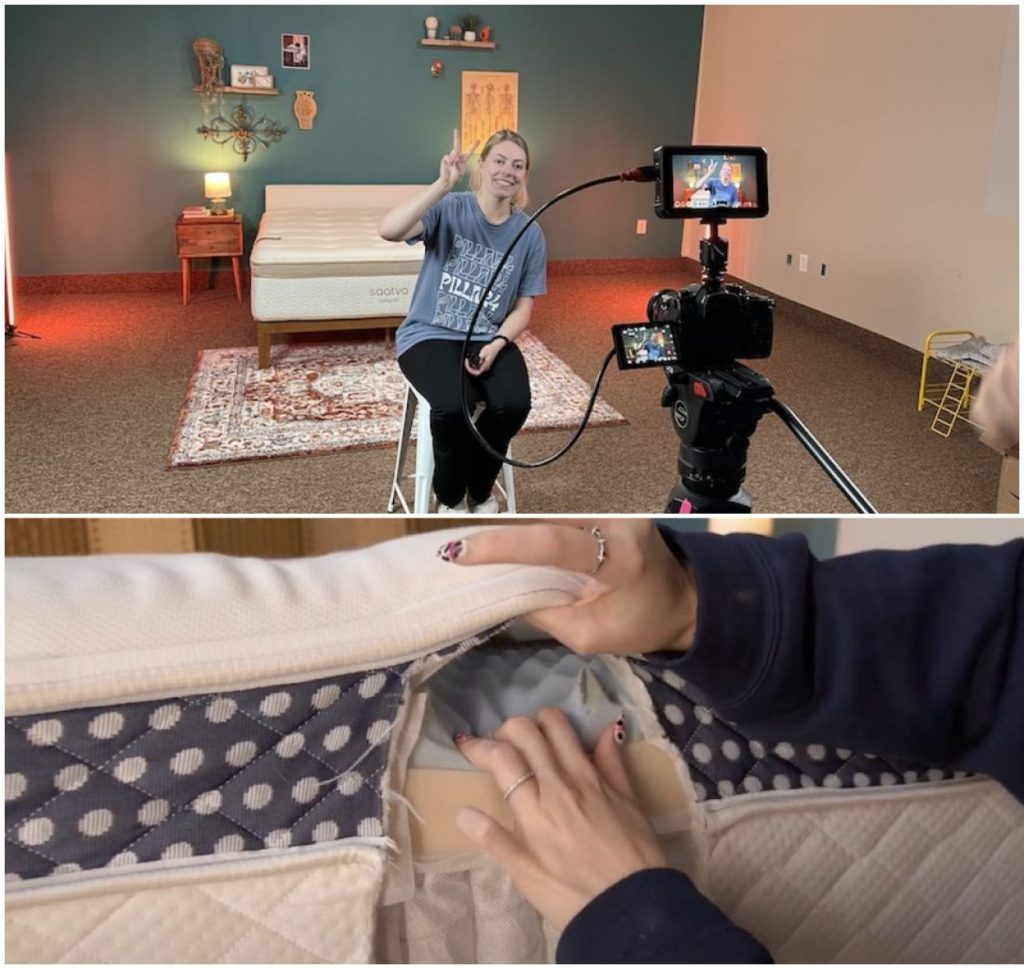
Top 8 Beds for Light Sleepers Reviews
Helix Midnight – Editor’s Pick
Helix Midnight Mattress

Part of Helix’s core line of mattresses, the Midnight has a hybrid construction that’s particularly suited to back and side sleepers.
Material
Hybrid
Trial Period
100 nights
Shipping Method
Free shipping
Firmness
Medium-firm: 6/10
Warranty
10-year warranty
Price Range
$$$$$
We recommend this mattress for the following sleeper types:
Couples
This bed has great motion isolation so you will not feel your partner tossing and turning at night.Back Sleeping
Ideal for lightweight and average weight back sleepers.Side Sleeping
Ideal for lightweight and average weight side sleepers.Financing Options
Financing options are available for this mattress.
Helix Midnight Mattress

Part of Helix’s core line of mattresses, the Midnight has a hybrid construction that’s particularly suited to back and side sleepers.
Material
Hybrid
Warranty
10-year warranty
Firmness
Medium-firm: 6/10
Shipping Method
Free shipping
Trial Period
100 nights
Price Range
$$$$$
We recommend this mattress for the following sleeper types:
Couples
This bed has great motion isolation so you will not feel your partner tossing and turning at night.Back Sleeping
Ideal for lightweight and average weight back sleepers.Side Sleeping
Ideal for lightweight and average weight side sleepers.Financing Options
Financing options are available for this mattress.

Helix Midnight Mattress
Part of Helix’s core line of mattresses, the Midnight has a hybrid construction that’s particularly suited to back and side sleepers.
Material
Hybrid
Firmness
Medium-firm: 6/10
Trial Period
100 nights
Warranty
10-year warranty
Shipping Method
Free shipping
Price Range
$$$$$
We recommend this mattress for the following sleeper types:
Couples
This bed has great motion isolation so you will not feel your partner tossing and turning at night.Back Sleeping
Ideal for lightweight and average weight back sleepers.Side Sleeping
Ideal for lightweight and average weight side sleepers.Financing Options
Financing options are available for this mattress.
As a light sleeper, finding a mattress that meets your needs gives you the best chance of achieving less-interrupted rest. The Midnight, a popular hybrid model from Helix, contains different features that should help people easily awakened for various reasons.

Hot sleepers who wake up frequently throughout the night because of overheating should appreciate the Midnight’s cooling features. These features include a breathable soft-knit cover and a layer of coils to foster airflow throughout the mattress.
Helix also aims to limit motion transfer from the coils by individually wrapping them, allowing them to move independently of one another. This is further supported by the memory foam layer, a great material for absorbing motion.
Why we love it
- The Helix Midnight is rated at a medium-firm feel, which is usually the ideal comfort level for most sleepers. However, exclusive stomach sleepers or heavier individuals may prefer something firmer for better rest.
Customer Reviews of the Helix Midnight
The Helix Midnight rates 4.5 stars out of 5 on Helix’s website. The main negative is that reviewers tend to find it too soft for their liking and feel as though they’re sinking. But overall, users say they’re getting a great nights’ sleep and some pain relief.
Want to read more? Check out our full Helix Midnight review.
Emma Original – Best Memory Foam Mattress for Light Sleepers
Emma Mattress
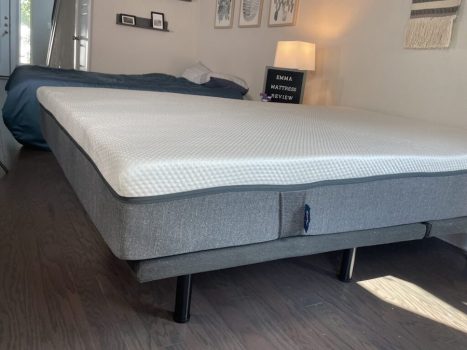
The Emma mattress offers support, cooling, and motion isolation, so it’s a good option for hot sleepers, couples, and those in need of maximum support for healthy sleep posture.
Material
Foam
Trial Period
365 nights
Shipping Method
Free shipping
Firmness
Medium: 5/10
Warranty
10-year warranty
Price Range
$$$$$
We recommend this mattress for the following sleeper types:
Hot Sleepers
If you often overheat while you sleep, this mattress should help you stay cool.Kids
This bed is perfect for young sleepers.Back Sleeping
Ideal for lightweight and average weight back sleepers.Financing Options
Financing options are available for this mattress.
Emma Mattress

The Emma mattress offers support, cooling, and motion isolation, so it’s a good option for hot sleepers, couples, and those in need of maximum support for healthy sleep posture.
Material
Foam
Warranty
10-year warranty
Firmness
Medium: 5/10
Shipping Method
Free shipping
Trial Period
365 nights
Price Range
$$$$$
We recommend this mattress for the following sleeper types:
Hot Sleepers
If you often overheat while you sleep, this mattress should help you stay cool.Kids
This bed is perfect for young sleepers.Back Sleeping
Ideal for lightweight and average weight back sleepers.Financing Options
Financing options are available for this mattress.

Emma Mattress
The Emma mattress offers support, cooling, and motion isolation, so it’s a good option for hot sleepers, couples, and those in need of maximum support for healthy sleep posture.
Material
Foam
Firmness
Medium: 5/10
Trial Period
365 nights
Warranty
10-year warranty
Shipping Method
Free shipping
Price Range
$$$$$
We recommend this mattress for the following sleeper types:
Hot Sleepers
If you often overheat while you sleep, this mattress should help you stay cool.Kids
This bed is perfect for young sleepers.Back Sleeping
Ideal for lightweight and average weight back sleepers.Financing Options
Financing options are available for this mattress.
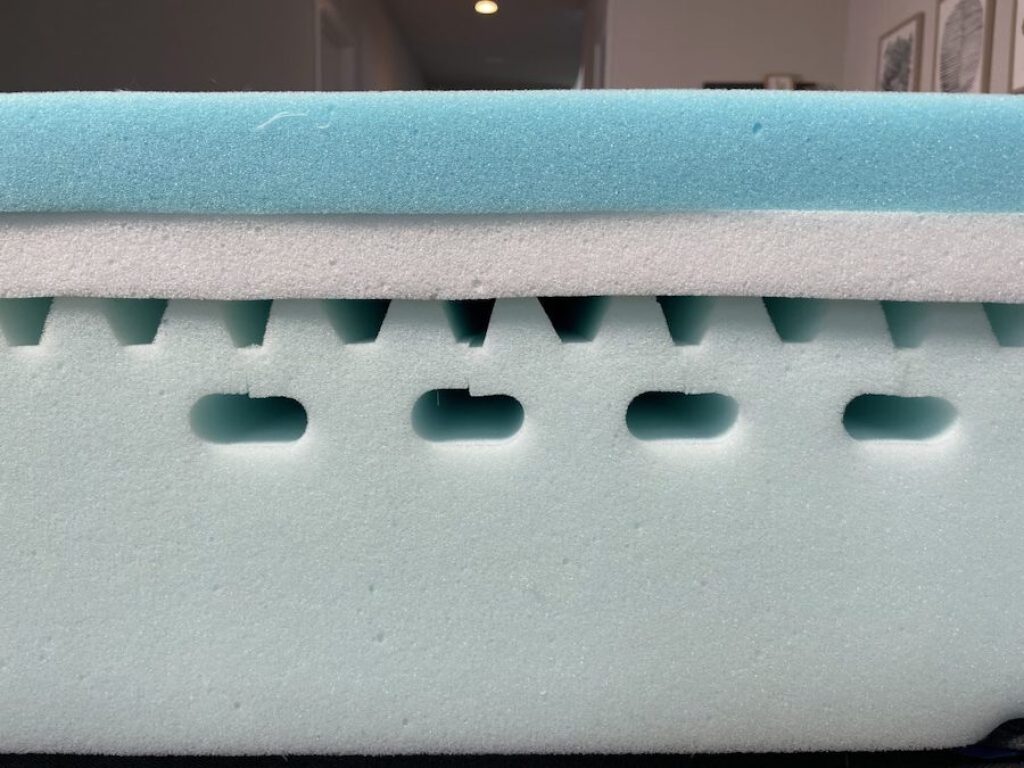
Memory foam is one of the most effective materials when it comes to damping motion, so if you have a partner whose movements keep you up at night, you may want to consider an all-foam bed like the Emma Original. Not only is this bed a star when it comes to pressure relief, it has cooling technology that makes it more breathable than traditional foam mattresses.
The Emma Original is made up of three unique foam layers: the first is a breathably constructed Airgocell® foam, the second is a cushioning Halo Memory Foam™, and the third and final layer is a base of High Resiliency Extra foam for support and alignment. These layers work together to create a plush surface that should cradle you while also mitigating the transfer of any restless movements across it.
What else should you know?
- The Emma Original is 100% vegan! It doesn’t have any animal-related products in its construction.
- Its foams are also CertiPUR-US® certified, meaning they’ve been tested for emittance of harmful chemicals.
Customer Reviews of the Emma Original
On the Emma website, reviews of their original mattress put it at 4.7 out of 5 stars. One negative aspect of the Emma Original mattress, according to some customers, is its softer firmness level, while a positive aspect highlighted by many customers is its excellent motion isolation.
Interested in exploring further? Visit our in-depth Emma Original review or our picks for the best memory foam mattress.
DreamCloud Premier Memory Foam – Best Luxury Mattress for Light Sleepers
DreamCloud Premier Memory Foam

The DreamCloud Premier Memory foam mattress offers luxury pressure point relief at an affordable price.
Material
Foam
Trial Period
365 nights
Shipping Method
Free shipping minus HI and AK
Firmness
Medium: 5.5/10
Warranty
Forever Warranty
Price Range
$$$$$
We recommend this mattress for the following sleeper types:
Couples
This bed has great motion isolation so you will not feel your partner tossing and turning at night.Back Sleeping
Ideal for average weight back sleepers.Side Sleeping
Ideal for average weight side sleepers.Stomach Sleeping
Ideal for average weight stomach sleepers.Financing Options
Financing options are available for this mattress.
DreamCloud Premier Memory Foam

The DreamCloud Premier Memory foam mattress offers luxury pressure point relief at an affordable price.
Material
Foam
Warranty
Forever Warranty
Firmness
Medium: 5.5/10
Shipping Method
Free shipping minus HI and AK
Trial Period
365 nights
Price Range
$$$$$
We recommend this mattress for the following sleeper types:
Couples
This bed has great motion isolation so you will not feel your partner tossing and turning at night.Back Sleeping
Ideal for average weight back sleepers.Side Sleeping
Ideal for average weight side sleepers.Stomach Sleeping
Ideal for average weight stomach sleepers.Financing Options
Financing options are available for this mattress.

DreamCloud Premier Memory Foam
The DreamCloud Premier Memory foam mattress offers luxury pressure point relief at an affordable price.
Material
Foam
Firmness
Medium: 5.5/10
Trial Period
365 nights
Warranty
Forever Warranty
Shipping Method
Free shipping minus HI and AK
Price Range
$$$$$
We recommend this mattress for the following sleeper types:
Couples
This bed has great motion isolation so you will not feel your partner tossing and turning at night.Back Sleeping
Ideal for average weight back sleepers.Side Sleeping
Ideal for average weight side sleepers.Stomach Sleeping
Ideal for average weight stomach sleepers.Financing Options
Financing options are available for this mattress.
If you’re looking for a high-end mattress to help you sleep more soundly through the night, consider the DreamCloud Premier Memory Foam. As a member of the brand’s “Premier” line, it’s a step up from the core DreamCloud models. It has no less than five layers of cushioning foam beneath its soft, cashmere blend cover, creating an oasis of pressure relief that’s also likely to stop motion transfer in its tracks. In fact, we gave it a perfect score for motion isolation: 5 out of 5.
What stands out about it?
- There are two distinct types of foam quilted into this bed’s fancy cover: a gel-infused memory foam for an immediately soothing sink, and a more supportive foam to bolster it. Another layer of memory foam follows, so you’re definitely going to feel cradled by this mattress.
Customer Reviews of the DreamCloud Premier Memory Foam
The DreamCloud Premier Memory Foam scores a solid 4.5 out of 5 stars from customers on its website. For the most part, the customers loved its comforting and cradling feel, but some pointed out that it’s not as firm as they expected.
Want to read more? Scroll through our full review of the DreamCloud Premier Memory Foam, or see our picks for the best luxury mattresses.
WinkBed – Best Mattress for Light Sleepers with Back Pain
WinkBed Mattress

WinkBed is a luxury hybrid bed with a variety of comfort features that should make it a versatile pick for most sleeping positions.
Material
Hybrid
Trial Period
120 nights
Shipping Method
Free shipping
Firmness
Multiple firmness options
Warranty
Lifetime warranty
Price Range
$$$$$
We recommend this mattress for the following sleeper types:
Hot Sleepers
If you often overheat while you sleep, this mattress should help you stay cool.Back Pain
This bed is perfect for anyone suffering from back pain.Back Sleeping
Ideal for lightweight and average weight back sleepers.Side Sleeping
Ideal for lightweight and average weight side sleepers.Stomach Sleeping
Ideal for average weight stomach sleepers.Financing Options
Financing options are available for this mattress.
WinkBed Mattress

WinkBed is a luxury hybrid bed with a variety of comfort features that should make it a versatile pick for most sleeping positions.
Material
Hybrid
Warranty
Lifetime warranty
Firmness
Multiple firmness options
Shipping Method
Free shipping
Trial Period
120 nights
Price Range
$$$$$
We recommend this mattress for the following sleeper types:
Hot Sleepers
If you often overheat while you sleep, this mattress should help you stay cool.Back Pain
This bed is perfect for anyone suffering from back pain.Back Sleeping
Ideal for lightweight and average weight back sleepers.Side Sleeping
Ideal for lightweight and average weight side sleepers.Stomach Sleeping
Ideal for average weight stomach sleepers.Financing Options
Financing options are available for this mattress.

WinkBed Mattress
WinkBed is a luxury hybrid bed with a variety of comfort features that should make it a versatile pick for most sleeping positions.
Material
Hybrid
Firmness
Multiple firmness options
Trial Period
120 nights
Warranty
Lifetime warranty
Shipping Method
Free shipping
Price Range
$$$$$
We recommend this mattress for the following sleeper types:
Hot Sleepers
If you often overheat while you sleep, this mattress should help you stay cool.Back Pain
This bed is perfect for anyone suffering from back pain.Back Sleeping
Ideal for lightweight and average weight back sleepers.Side Sleeping
Ideal for lightweight and average weight side sleepers.Stomach Sleeping
Ideal for average weight stomach sleepers.Financing Options
Financing options are available for this mattress.

Back pain is highly uncomfortable and can make trying to sleep through the night a challenge. However, a quality mattress can help alleviate back pain for more peaceful slumber. Luckily, the WinkBed is designed to target back pain by balancing support and comfort.
One of the most important mattress components when dealing with back pain is the capability to keep the spine properly aligned. The WinkBed’s hybrid construction has zones in both its foam and coil layers to ensure lift and give in all the right places, especially when it comes to the lumbar region.
Why should you buy it?
- The WinkBed comes in multiple firmness options: Softer, Luxury Firm, and Firmer. There’s even a specialized Plus option for folks over 300 pounds.
- Reinforced edges mean you can take advantage of the full surface area of the mattress.
Customer Reviews of the Winkbed
On the WinkBeds site, the WinkBed earns a 4.8 out of 5 stars. One drawback of the WinkBed mattress is that it might be too expensive for budget-conscious shoppers, but overall it offers excellent durability and customizable firmness options.
Interested in exploring further? Visit our in-depth Winkbeds mattress review or our list of the best mattresses for back pain.
Helix Dawn – Best Mattress for Light Sleepers Who Sleep on Their Stomach
Helix Dawn Mattress
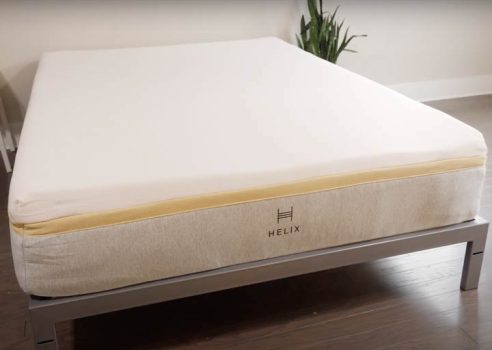
This hybrid mattress was specifically designed for those who love a firm but contouring mattress.
Material
Hybrid
Trial Period
100 nights
Shipping Method
Free shipping
Firmness
Firm: 7.5/10
Warranty
10-year warranty
Price Range
$$$$$
We recommend this mattress for the following sleeper types:
Couples
This bed has great motion isolation so you will not feel your partner tossing and turning at night.Back Sleeping
Ideal for average weight back sleepers.Stomach Sleeping
Ideal for lightweight and average weight stomach sleepers.Financing Options
Financing options are available for this mattress.
Helix Dawn Mattress

This hybrid mattress was specifically designed for those who love a firm but contouring mattress.
Material
Hybrid
Warranty
10-year warranty
Firmness
Firm: 7.5/10
Shipping Method
Free shipping
Trial Period
100 nights
Price Range
$$$$$
We recommend this mattress for the following sleeper types:
Couples
This bed has great motion isolation so you will not feel your partner tossing and turning at night.Back Sleeping
Ideal for average weight back sleepers.Stomach Sleeping
Ideal for lightweight and average weight stomach sleepers.Financing Options
Financing options are available for this mattress.

Helix Dawn Mattress
This hybrid mattress was specifically designed for those who love a firm but contouring mattress.
Material
Hybrid
Firmness
Firm: 7.5/10
Trial Period
100 nights
Warranty
10-year warranty
Shipping Method
Free shipping
Price Range
$$$$$
We recommend this mattress for the following sleeper types:
Couples
This bed has great motion isolation so you will not feel your partner tossing and turning at night.Back Sleeping
Ideal for average weight back sleepers.Stomach Sleeping
Ideal for lightweight and average weight stomach sleepers.Financing Options
Financing options are available for this mattress.

The Helix Dawn has a firmer feel that should accommodate most stomach sleepers. People who lie on their stomach typically feel more comfortable on firmer beds as these do a better job of preventing their midsection from sinking too far. In the case of a light sleeper, the more comfortable the bed, the better your chances of sleeping through the night.
The bed’s coils should provide airflow to further keep you cool and comfy, plus they’re individually wrapped to help cancel out motion transfer.
Why we love it
- The Helix Dawn should be fairly responsive, with foams that mimic the springy quality of latex above the bed’s spring unit. Although this bounce can sometimes detract from motion isolation, it also makes moving around atop the bed easier. Combination sleepers who spend a lot of time on their stomachs may therefore think it’s a great match.
Customer Reviews of the Helix Dawn
The Helix Dawn has an average of 4.4 out of 5 stars on the Helix website. Negative reviews say that the mattress seems to get softer over time, but the majority positive reviews claim the bed is comfortable and has helped with aches and pains.
Want to learn more? Read our full Helix Dawn review or check out our picks for the best mattresses for stomach sleepers.
Nolah Natural – Best Mattress for Light Sleepers Who Sleep on Their Back
Nolah Natural Mattress

Nolah’s Natural Latex Hybrid is crafted from high-quality natural and organic materials, serving as a luxurious option for eco-friendly shoppers.
Material
Latex
Trial Period
120 Nights
Shipping Method
Free shipping
Firmness
Medium-firm: 6/10
Warranty
Lifetime warranty
Price Range
$$$$$
We recommend this mattress for the following sleeper types:
Hot Sleepers
If you often overheat while you sleep, this mattress should help you stay cool.Back Pain
This bed is perfect for anyone suffering from back pain.Back Sleeping
Ideal for lightweight, average weight, and heavyweight back sleepers.Side Sleeping
Ideal for lightweight, average weight, and heavyweight side sleepers.Stomach Sleeping
Ideal for lightweight stomach sleepers.Financing Options
Financing options are available for this mattress.
Nolah Natural Mattress

Nolah’s Natural Latex Hybrid is crafted from high-quality natural and organic materials, serving as a luxurious option for eco-friendly shoppers.
Material
Latex
Warranty
Lifetime warranty
Firmness
Medium-firm: 6/10
Shipping Method
Free shipping
Trial Period
120 Nights
Price Range
$$$$$
We recommend this mattress for the following sleeper types:
Hot Sleepers
If you often overheat while you sleep, this mattress should help you stay cool.Back Pain
This bed is perfect for anyone suffering from back pain.Back Sleeping
Ideal for lightweight, average weight, and heavyweight back sleepers.Side Sleeping
Ideal for lightweight, average weight, and heavyweight side sleepers.Stomach Sleeping
Ideal for lightweight stomach sleepers.Financing Options
Financing options are available for this mattress.

Nolah Natural Mattress
Nolah’s Natural Latex Hybrid is crafted from high-quality natural and organic materials, serving as a luxurious option for eco-friendly shoppers.
Material
Latex
Firmness
Medium-firm: 6/10
Trial Period
120 Nights
Warranty
Lifetime warranty
Shipping Method
Free shipping
Price Range
$$$$$
We recommend this mattress for the following sleeper types:
Hot Sleepers
If you often overheat while you sleep, this mattress should help you stay cool.Back Pain
This bed is perfect for anyone suffering from back pain.Back Sleeping
Ideal for lightweight, average weight, and heavyweight back sleepers.Side Sleeping
Ideal for lightweight, average weight, and heavyweight side sleepers.Stomach Sleeping
Ideal for lightweight stomach sleepers.Financing Options
Financing options are available for this mattress.
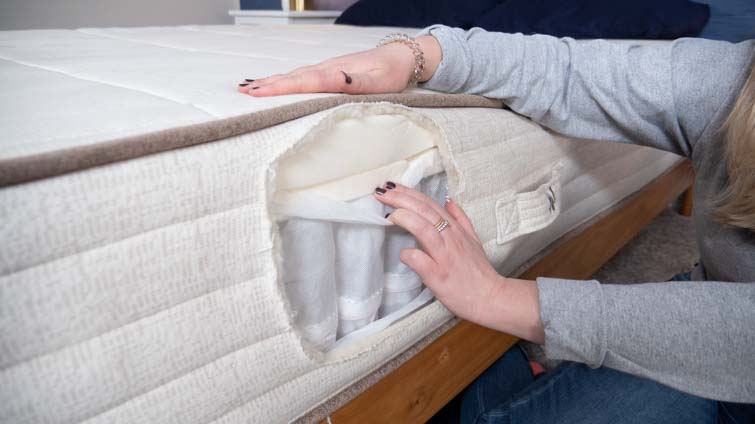
Light sleepers sometimes struggle to stay asleep due to motion transfer, so it’s important to have a mattress that can isolate movement. In addition, light back sleepers need support for proper spine alignment and some pressure relief for the lower back. These folks should consider the Nolah Natural, a hybrid mattress with Tri-Zone™ coils offering targeted support, excellent for dedicated back sleepers.
The Nolah Natural features eco-friendly and hypoallergenic Talalay latex, an organic cotton cover, and GOTS-certified organic wool. In addition, the bed provides pressure relief in the most sensitive areas, such as the hips, shoulders, and lower back, so it’s equally good for those who sometimes sleep on the side.
What stands out?
- Light sleepers should like the bed’s ability to absorb motion. The mattress has Talalay latex layers that isolate movement so that partners don’t wake each other up when tossing and turning.
- The Nolah Natural is designed and made entirely in the USA.
Customer Reviews of the Nolah Natural
On Nolah’s website, the Nolah Natural gets a 4.8 out of 5 stars. Customers appreciate the Nolah Natural mattress for its eco-friendly materials and pressure relief, but some have reported a minimal initial off-gassing odor upon setup.
Looking for more info? Read our full Nolah Natural mattress overview here, or our picks for the best mattresses for back sleepers.
Bear Star Hybrid – Best Cooling Mattress for Light Sleepers
Bear Star Hybrid Mattress
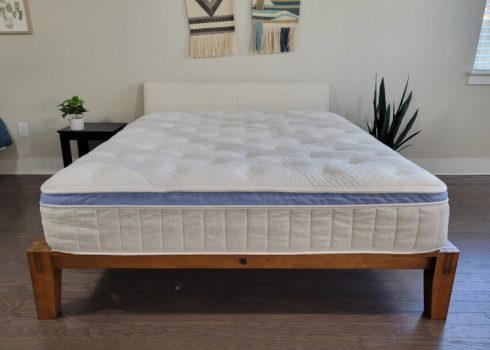
The Bear Hybrid is an appealing product because it should cater to a wide variety of sleepers.
Material
Hybrid
Trial Period
120 nights
Shipping Method
Free shipping
Firmness
Medium-firm: 6/10
Warranty
Lifetime warranty
Price Range
$$$$$
We recommend this mattress for the following sleeper types:
Hot Sleepers
If you often overheat while you sleep, this mattress should help you stay cool.Joint Pain
This bed is perfect for anyone suffering from joint pain.Back Sleeping
Ideal for lightweight back sleepers.Side Sleeping
Ideal for average weight side sleepers.Financing Options
Financing options are available for this mattress.
Bear Star Hybrid Mattress

The Bear Hybrid is an appealing product because it should cater to a wide variety of sleepers.
Material
Hybrid
Warranty
Lifetime warranty
Firmness
Medium-firm: 6/10
Shipping Method
Free shipping
Trial Period
120 nights
Price Range
$$$$$
We recommend this mattress for the following sleeper types:
Hot Sleepers
If you often overheat while you sleep, this mattress should help you stay cool.Joint Pain
This bed is perfect for anyone suffering from joint pain.Back Sleeping
Ideal for lightweight back sleepers.Side Sleeping
Ideal for average weight side sleepers.Financing Options
Financing options are available for this mattress.

Bear Star Hybrid Mattress
The Bear Hybrid is an appealing product because it should cater to a wide variety of sleepers.
Material
Hybrid
Firmness
Medium-firm: 6/10
Trial Period
120 nights
Warranty
Lifetime warranty
Shipping Method
Free shipping
Price Range
$$$$$
We recommend this mattress for the following sleeper types:
Hot Sleepers
If you often overheat while you sleep, this mattress should help you stay cool.Joint Pain
This bed is perfect for anyone suffering from joint pain.Back Sleeping
Ideal for lightweight back sleepers.Side Sleeping
Ideal for average weight side sleepers.Financing Options
Financing options are available for this mattress.
Light sleepers who sleep hot usually struggle to find a comfortable position. Overheating and hot flashes can make it difficult to fall asleep, but a cooling mattress should help mitigate this.
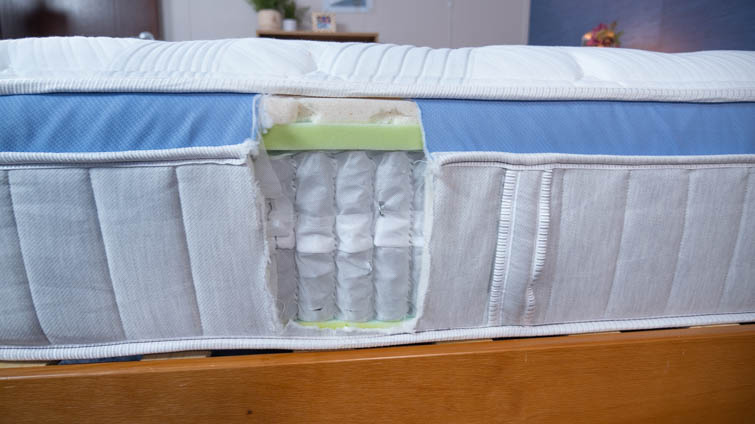
The Bear Star Hybrid has a unique construction that starts with a Celliant® cover. Celliant® is a performance textile designed to convert kinetic energy into infrared light, which should improve oxygen levels in the blood. Below the surface is a copper memory foam foam that helps prevent overheating by pulling the heat away from your body. The coil unit features 8-inch coils that give this bed some bounce while improving airflow and breathability.
Why did we pick it?
- The Bear Star Hybrid features a GREENGUARD Gold certification, which may interest those looking for a more eco-conscious mattress.
- The Bear Star Hybrid has good edge support thanks to the coils that go from edge to edge. This design prevents the edges from sagging.
Customer Reviews of the Bear Star Hybrid
Coming in at approximately 4.5 out of 5 stars on Bear’s site, the Bear Star Hybrid has generally positive reviews. Customers praise the Bear Star Hybrid mattress for its excellent cooling properties, however some have found it to be on the firmer side, which might not be suitable for those seeking a softer feel.
Want more details? Read our full Bear Star Hybrid review or our best cooling mattresses.
Brooklyn Bedding Brooklyn Essential – Best Medium Firm Mattress for Light Sleepers
Brooklyn Bedding Essential

The Brooklyn Essential is an impressively affordable hybrid with a simple yet satisfying construction.
Material
Hybrid
Trial Period
120 nights
Shipping Method
Free shipping
Firmness
Medium-firm: 6.5/10
Warranty
10-year warranty
Price Range
$$$$$
We recommend this mattress for the following sleeper types:
Hot Sleepers
If you often overheat while you sleep, this mattress should help you stay cool.Back Sleeping
Ideal for lightweight and average weight back sleepers.Side Sleeping
Ideal for lightweight and average weight side sleepers.Financing Options
Financing options are available for this mattress.
Brooklyn Bedding Essential

The Brooklyn Essential is an impressively affordable hybrid with a simple yet satisfying construction.
Material
Hybrid
Warranty
10-year warranty
Firmness
Medium-firm: 6.5/10
Shipping Method
Free shipping
Trial Period
120 nights
Price Range
$$$$$
We recommend this mattress for the following sleeper types:
Hot Sleepers
If you often overheat while you sleep, this mattress should help you stay cool.Back Sleeping
Ideal for lightweight and average weight back sleepers.Side Sleeping
Ideal for lightweight and average weight side sleepers.Financing Options
Financing options are available for this mattress.

Brooklyn Bedding Essential
The Brooklyn Essential is an impressively affordable hybrid with a simple yet satisfying construction.
Material
Hybrid
Firmness
Medium-firm: 6.5/10
Trial Period
120 nights
Warranty
10-year warranty
Shipping Method
Free shipping
Price Range
$$$$$
We recommend this mattress for the following sleeper types:
Hot Sleepers
If you often overheat while you sleep, this mattress should help you stay cool.Back Sleeping
Ideal for lightweight and average weight back sleepers.Side Sleeping
Ideal for lightweight and average weight side sleepers.Financing Options
Financing options are available for this mattress.
The Brooklyn Bedding Brooklyn Essential is a hybrid model with a medium firmness that should accommodate most sleepers, including couples. It incorporates several features that should help curb motion transfer for those easily disturbed by their partner’s movements, including high-density comfort layers at the top and individually encased coils. The coils also foster airflow for added cooling.
Why we picked it
- The Brooklyn Bedding Brooklyn Essential’s middle-ground feel should be great for most sleepers, as it can deliver firm support needed for good body alignment while giving ample pressure relief to achy joints. This design should provide a more comfortable bed space to help you get a better night’s rest.
Customer Reviews of the Brooklyn Essential
According to Brooklyn Bedding’s website, the Essential mattress scores about 4.5 out of 5 stars. Users have noted that the Brooklyn Bedding Essential mattress offers a budget-friendly option for customers, however some have mentioned that it may not be as durable as higher-priced alternatives.
Need to know more? Check out our picks for the best medium-firm mattresses.
What is a Mattress for Light Sleepers?
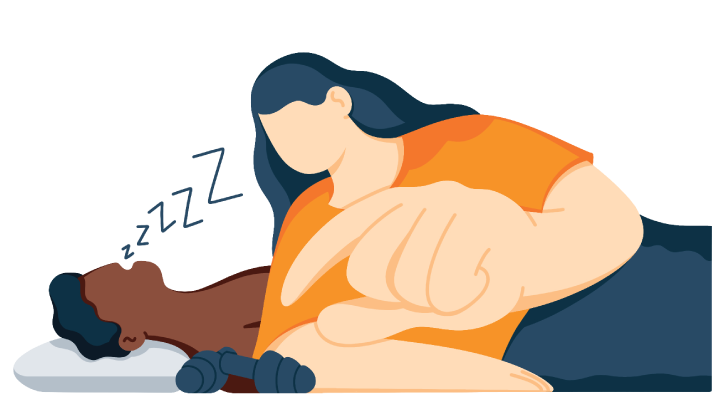
Light sleepers may be easily awakened by small noises or movements, such as a dog barking outside or a sleeping partner changing positions throughout the night. Consistent, non-interrupted sleep is a crucial factor for brain function1, and poor sleep habits are linked to severe health issues such as obesity, heart disease, and hypertension. One way to get better sleep is to invest in a mattress that is beneficial to those who are easily awakened.
A good mattress for light sleepers is going to be one that’s designed to minimize potential distractions such as movement, as well as something that fosters a more comfortable sleeping experience for the individual.
One way for light sleepers to get deeper sleep is by procuring a mattress for light sleepers. Mattresses for light sleepers should have excellent motion isolation. This means that the movements made by partners or pets will not easily transfer across the bed. Light sleepers will likely sleep best on a bed that makes minimal noise. Although memory foam mattresses are typically known to have minimal motion transfer and low noise levels, there are other types of mattresses that can work well for light sleepers.
What to Look for In A Mattress for Light Sleepers
Considering that light sleepers are more prone to waking up in the middle of the night, there are specific mattress characteristics that could help them sleep more soundly.
may wake up if a partner moves in bed or if the bed squeaks with each position change, mattresses that isolate the motion made by a co-sleeper, as well as those that are quiet should be at the top of most light sleepers lists. However, there are other factors that light sleepers will want to consider as well, these include cooling, edge support, and pressure relief.
When your bed keeps you from getting overheated, you tend to fall into a deeper sleep. This is because the circadian rhythms that regulate your sleep cycles are affected by temperature. Your body temperature begins to fall2 as bedtime approaches and continues to do so until the early morning when it starts to warm back up to signal that it is time to get up. Selecting a bed with cooling elements is likely to help keep your body temperature from rising too quickly.
Mattresses that provide adequate support for your body weight and sleep position, as well as those that have pressure-relieving properties can also keep sleepers more comfortable and thus better rested. However, support and pressure relief are largely dependent on your preferred sleep position and body weight, and we will go into this in more detail later in this article.
Additionally, if you are a light sleeper who tends to track toward the outside of the bed, you will want to make sure that your mattress has excellent edge support. Without proper edge support, you may feel that you are falling off the bed when sleeping on the puter portion. This may startle light sleepers and cause them to wake abruptly.
Type of Mattress

Innerspring Mattresses
When you picture a “traditional bed”, an image of an innerspring mattress is most likely what comes to mind. The base of innerspring mattresses is made of a coil support system that is covered by a comfort layer that is usually made of foam or fiber. The coils are typically made of steel, but you can find individually-wrapped coils, as well as Bonnell, and offset.
While innerspring beds can offer great benefits like support, airflow, and bounce, they also have some qualities that could be a drawback to light sleepers, such as high motion transfer and minimal pressure relief. Another factor to be mindful of is how noisy the coils may become over time.
Hybrid Mattresses
Hybrid mattresses blend features from innerspring mattresses and those made from foam into one. Typically, these beds have a base made from coils and several comfort layers consisting of foam that rest on top of the coils. Many people are drawn to these beds because they offer the supportiveness of innerspring beds with the pressure-relieving comfort of foam mattresses.
They also can reduce motion transfer better than traditional innerspring models.
Although the combination of memory foam and innerspring coils is the most common combination of these beds, there are iterations that use latex, polyfoam, and even proprietary materials.
Memory Foam Mattresses
By combining polyurethane with other chemicals, memory foam mattresses are able to contour your body to provide pressure relief. This contouring happens through a process called viscoelasticity, which allows the foam to move slowly, change shape, and then return to its original form. Not only does this allow memory foam mattresses to shape and cradle your body, but it also typically makes these mattresses good at isolating motion, which often makes them a great fit for light sleepers.
There are three types of memory foam mattresses: traditional, open-cell, and gel.
- Traditional – This type of memory foam mattress was the first type to be introduced to the market and is made of one solid block of foam. It causes many people to heat up during the night, though, because air can’t circulate through it.
- Open Cell – Open cell memory foam was developed to combat the memory foam heating issue. This variation has “open pockets” that allow air to flow freely through the mattress.
- Gel – By infusing memory foam with gel (and, other naturally cooling materials such as copper), the surface temperature of the mattress is lowered and body heat is drawn away from the sleeper.
Latex Mattresses
Mattresses made from latex, especially natural latex, tend to be responsive. This means that, unlike memory foam, when you press your hand into a latex mattress and then take it away, the bed will regain its original shape very quickly. In addition to natural latex, which is derived from rubber trees, there is also synthetic latex. This material is made from various products, including petrochemicals. Synthetic latex does not respond as fast as its natural counterpart.
Latex tends to have better temperature regulation than memory foam, and natural latex is a great hypoallergenic option (although those with latex allergies should be mindful when purchasing these kinds of mattresses). However, latex does not isolate motion as well as memory foam. This means that you are more likely to feel movements made by co-sleepers.
Other Considerations When Shopping for a Mattress for Light Sleepers
Sleeping Position
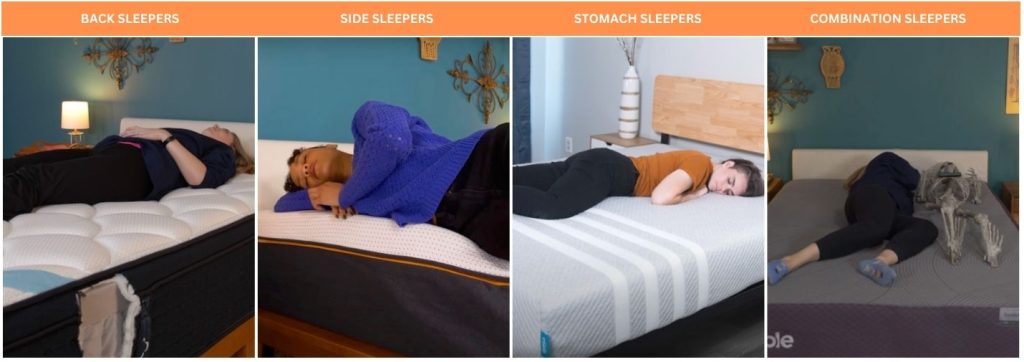
Your sleep position2 can affect your ability to sleep in negative and positive ways. If you’re easily awakened because of lower back pain, you may find that sleeping on your back may help alleviate this pain, whereas those who snore loud enough to wake themselves up could find deeper sleep by turning on their side. If it is heartburn and reflux that don’t allow you to sleep deeply, try sleeping on your left side2. Other times, it may be best to find the position that feels most natural and comfortable to you.
Weight/Body Type of Sleepers
Light sleepers may be more at risk for obesity3. If you are someone who struggles to get quality sleep, this can affect the bodily systems that regulate appetite and energy. Sleep deprivation is often associated with stress, and the body feels as if it needs extra energy to handle this, we receive energy from calories. Furthermore, being overweight can lead to issues such as sleep apnea or reflux, issues that may keep you from restful sleep.
When choosing a mattress, your weight and body type should be considered. For plus-size sleepers, there are many great brands on the market creating mattresses specifically for heavier bodies. Lighter and average-weight sleepers should also look at how certain beds could work for their weight. Petite sleepers, for example, may feel more comfortable on softer beds, particularly if they sleep on their side.
Firmness
If you are a light sleeper, the firmness of your mattress should be based on your personal preference. However, if you decide on a mattress that is either too hard or too soft, you could find yourself uncomfortable and waking easily.
When seeking out the firmness level that will work best for you, you will want to consider your preferred sleep position and your body type. Medium-firm mattresses tend to work for the widest range of body types and sleep positions. If you are a lighter-weight person, you will most likely sleep best on a softer mattress, and if you’re on the heavier side or someone who likes to sleep on your stomach, you may want to consider a firm mattress to help ensure a solid night’s sleep.
Cooling
Staying cool throughout the night is an important factor in sleeping well. Your sleep cycles are based on circadian rhythms that are affected by body temperature. To sleep well, the body starts lowering its temperature4 before bedtime and continues to do so throughout most of your sleep cycle. As morning approaches, your body will start to warm back up which signals that it is time to wake.
Breathable mattresses and beds with cooling technology help keep us from becoming too warm throughout the night. Allowing our body heat to dissipate through our mattress is one way that we can regulate our temperature and sleep more soundly.
Although memory foam has been known to sleep hot in the past, there are now many cooling options for these beds. Innerspring mattresses tend to allow for plenty of airflow, and natural latex is an airy material that helps keep temperatures down.
Motion Isolation
For light sleepers who sleep with partners, motion isolation is one of the most important factors when it comes to the type of mattress that you choose. Mattresses that isolate motion to the area where it originates can help keep light sleepers from being disturbed by their bedmate’s movements.
Memory foam beds typically do an excellent job at not allowing motion to transfer from one side of the bed to the other, but you will also be able to find some hybrid mattresses that do well in this category too since they have multiple foam layers to absorb movement and individually-wrapped coils to further reduce motion transfer.
Sex
Sexually-active couples typically enjoy beds that are more quick-responding for intimacy.
However, that can also mean the bed transfers movement more easily, which can quickly become distracting. A helpful solution is to seek out a mattress that’s going to have some bounce and responsiveness to it but one that also has motion-isolating capabilities for when it’s time to sleep. Hybrids are often a good chance because the coils create bounce while the foams on top help absorb movement.
If you are a sexually-active couple, take a look at our best mattresses for sex.
Pressure Relief
Pressure can sometimes build up around areas that come into contact with your mattress, which can lead to discomfort and prohibit light sleepers from getting adequate sleep by waking them throughout the night. Therefore, mattresses that provide pressure relief are likely to be beneficial to light sleepers.
Beds with memory foam are considered a front-runner for pressure relief, though it’s also important they’re not too firm for your body type and sleep position. Latex beds, particularly those with softer Talalay latex, can also relieve pressure well, though they’re not as slow-moving as memory foam.
Traditional innerspring models, which typically just have a thin comfort layer on top, won’t give much in terms of pressure relief though. In this case, a hybrid is a great alternative.
Read More: Best Mattresses for Pressure Relief
Edge Support
If you’ve ever had a dream where it feels like you’re falling out of bed, you know how unnerving that experience can be. As unpleasant as this sensation may be, actually falling out of bed is considerably worse, and if your bed lacks edge support, you may actually do this.
A mattress with proper edge support will allow you to utilize the whole bed without feeling as if you may fall out when you are close to the edge. This is a particularly important factor for light sleepers so they can remain comfortable along the sides of the bed, especially if spreading out from their partner means they’re less likely to wake up.
Budget
Budget is a consideration for everyone. Although finding a mattress that will help you fall into a deep slumber is the ultimate goal, you will need to do this as it pertains to your budget. Fortunately, there are a lot of quality mattresses that will help light sleepers rest more soundly that fit in a host of price ranges. Buying online direct from manufacturers can also help you save money on premium mattresses, and look for special deals around holidays throughout the year for extra savings.
Read more about our top-rated budget mattresses here.
Best Mattress for Light Sleepers FAQs
What should I do if my partner is a light sleeper?
If you’re continuously waking up your partner, there are a couple of things you can do to help them rest easier.
The first is to be more mindful of how you get into bed and whether you toss and turn during the night. If you know your partner is the type of person to wake up at the slightest disturbance, you’ll have to do your part to be less disruptive.
In this case, investing in a mattress that has superior motion isolation could be very helpful. These are the types of mattresses where you can drop a bowling ball on one side of the bed, and the glass of red wine you put on the other side won’t tip over.
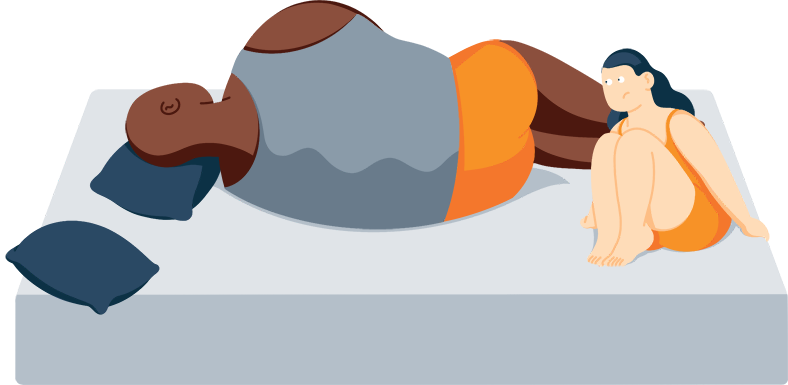
The best mattresses for motion isolation are memory foam, which is a type of foam that retains the shape of your body when you lie on it. This helps decrease the experience of motion transfer because the viscous surface muffles movement across the surface of the bed.
View Our Full Guide: Best Mattresses for Couples
How do I learn to become a light sleeper?
While restful sleep is important for your overall health, there are some instances when you may want to be more of a light sleeper. New parents, for example, often wake up to care for their infant and know they must stay alert.
Along with training yourself to sleep lightly, you might also consider using a sleep app that tracks your sleeping cycles. After a number of nights, the app suggests the ideal times for you to go to sleep and wake up. It makes sense that going to bed at the right time can help train your body for better sleep.
Can light sleep cause snoring?
It’s actually the other way around. Snoring can wake you up, even if you don’t realize it. People with sleep apnea, in particular, often snore and wake up throughout the night because their breathing is obstructed and the lack of oxygen5 to their brain alerts them to wake up.
Read More: Why Do People Snore? and Best Mattress for Snoring
| Mattress | Best For | Price (Queen Size) | Review |
| Helix Midnight | Editor’s Pick | $1,199 | Helix Midnight Mattress Review |
| Emma Original | Memory Foam | $1,399 | Emma Original Mattress Review |
| DreamCloud Premier Memory Foam | Luxury | $2,032 | DreamCloud Premier Memory Foam Mattress Review |
| WinkBed | Back Pain | $1,799 | WinkBed Mattress Review |
| Helix Dawn | Stomach Sleepers | $1,373.80 | Helix Dawn Mattress Review |
| Nolah Natural | Back Sleepers | $1,199 | Nolah Natural Mattress Review |
| Bear Star Hybrid | Cooling | $1,998 | Bear Star Hybrid Mattress Review |
| Brooklyn Bedding Brooklyn Essential | Medium Firm | $932 | Pending |

Melanie Kassel
Performance Editor
About Author
As Sleep Advisor’s Performance Editor, Melanie writes and edits content throughout the site to ensure it’s accurate, engaging, and up-to-date.
Combination Sleeper
References
- Medic, Goran., Wille, Michelle., Eh Hemels, Michiel. “Short- and long-term health consequences of sleep disruption”. National Library of Medicine. https://pubmed.ncbi.nlm.nih.gov/28579842/ 2017.
- “Choosing the Best Sleep Position”. Johns Hopkins Medicine. Webpage accessed June 27, 2024. https://www.hopkinsmedicine.org/health/wellness-and-prevention/choosing-the-best-sleep-position.
- Ogilvie PhD, Rachel P., Patel MD, Sanjay R. “The Epidemiology of Sleep and Obesity”. National Library of Medicine. https://www.ncbi.nlm.nih.gov/pmc/articles/PMC5714285/ 2017.
- Lok, Renske., van Koningsveld, Minke J., et. al., “Daytime melatonin and light independently affect human alertness and body temperature”. National Library of Medicine. https://pubmed.ncbi.nlm.nih.gov/31033013/. 2019.
- “Sleep Apnea”. Cleveland Clinic. Last modified November 15, 2022. https://my.clevelandclinic.org/health/diseases/8718-sleep-apnea#:~:text=This%20happens%20either%20because%20of,just%20enough%20to%20resume%20breathing.
